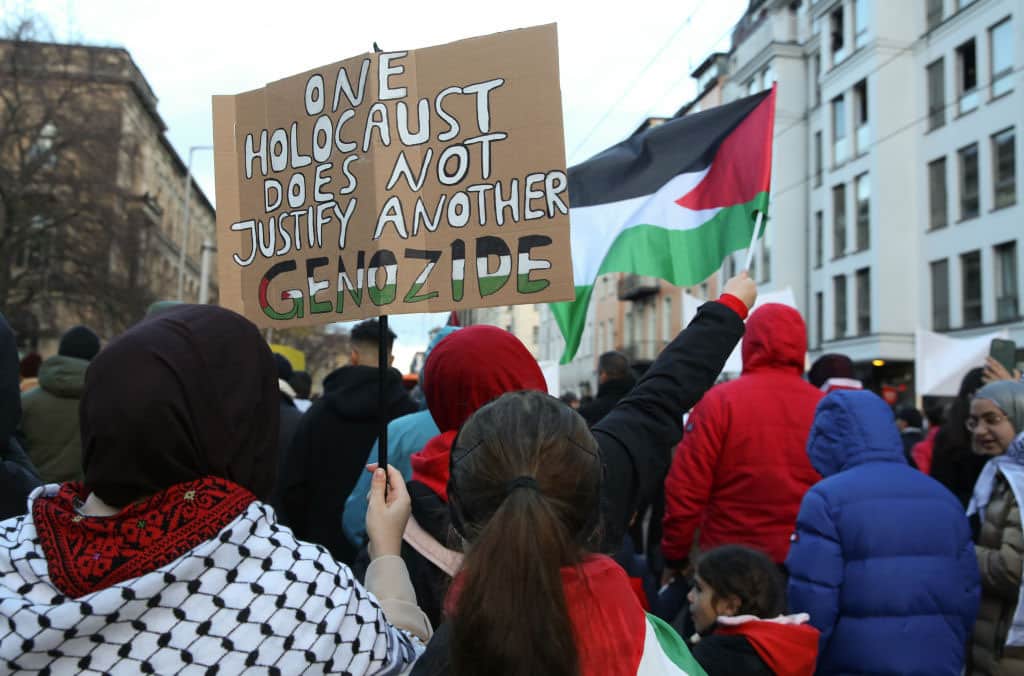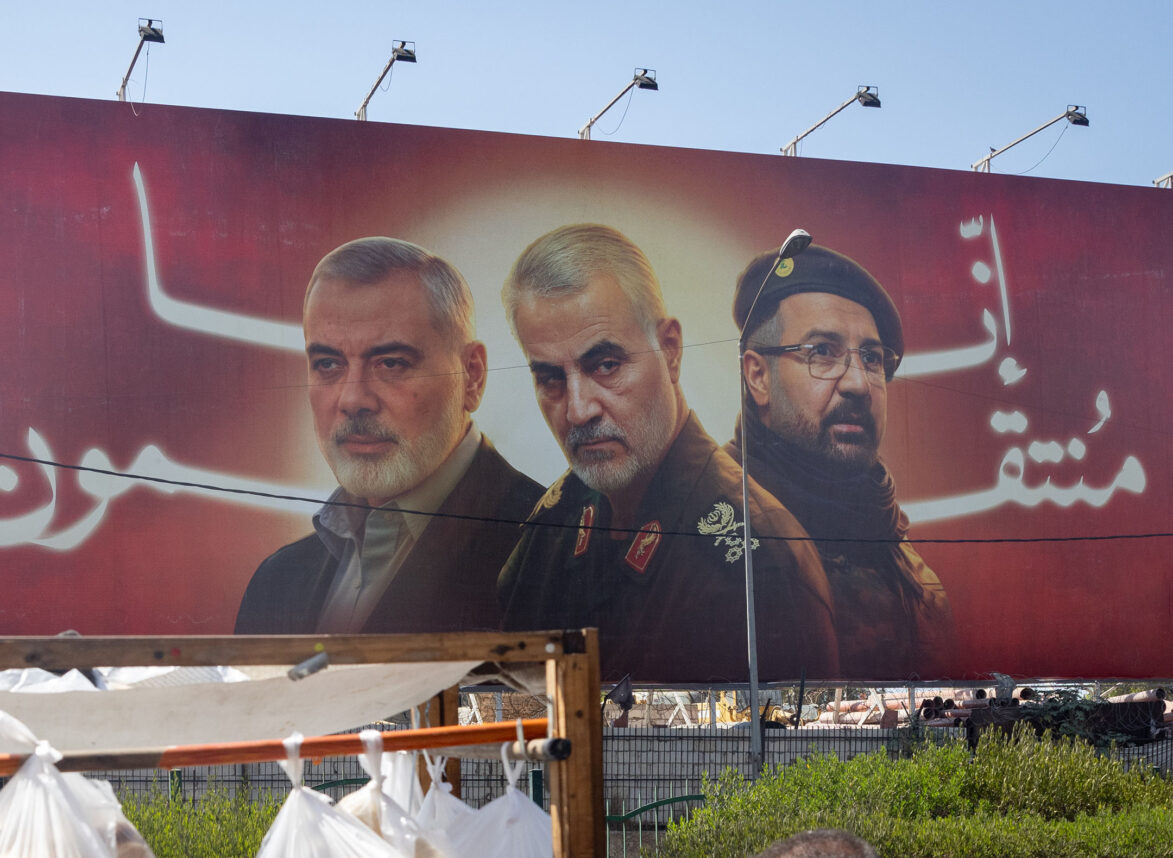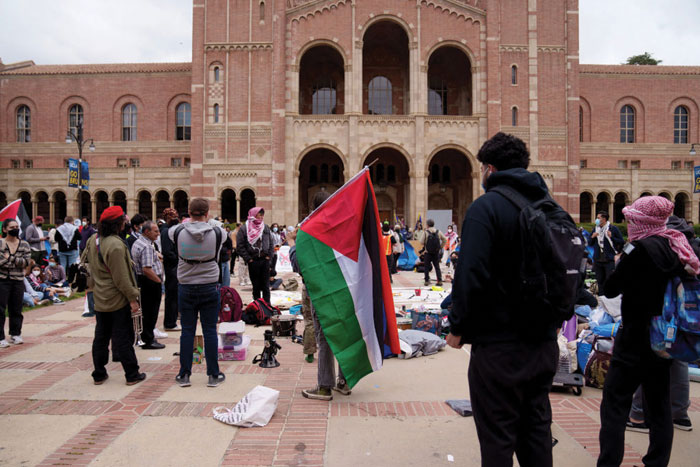
Israel’s war against Hamas following the Oct. 7 attacks has brought politically charged anti-Zionist buzzwords to a head. The ensuing Israel offense in Gaza has spurred ubiquitous accusations, from “genocide” — which saw particular consideration by the global community — to the usual “apartheid,” “colonization,” and “ethnic cleansing.” Setting aside that Gaza has not been subject to Israeli law nor residence since 2005, Israel’s opponents also use words to both demonize Israel and delegitimize the Jewish state and people as a whole.
In depicting Israel and the Jews at large as all-powerful entities, antisemitic anti-Zionists seek to offset the fact that Israel is a tiny landmass surrounded by 21 Arab and Muslim countries. Many of Israel’s neighbors are not only hostile, such as Hamas in Gaza and Hezbollah in Lebanon, but nuclear-capable, such as Iran and Pakistan. Moreover, antisemites masquerading as anti-Zionists often spread their ire to Diaspora Jews, depicting the Jewish community as wielding power over others. Whereas Nazi ideology framed Jews as both racially impure and helping to replace the “Aryan” race with other impure groups, today’s self-proclaimed “progressive” anti-Zionists frame Jews as oppressing “true” minority groups.
Indeed, the word “minority” seems to take on a different meaning when it comes to Jews in this day and age.
Indeed, the word “minority” seems to take on a different meaning when it comes to Jews in this day and age. Whereas the term tends to signify a relatively small group of people amidst a larger group, the United Nations further defines a minority as, “An ethnic, religious or linguistic minority is any group of persons which constitutes less than half of the population in the entire territory of a State whose members share common characteristics of culture, religion or language, or a combination of any of these.” This sociological context, however, still emphasizes size over relative power. By all accounts, comprising less than 2% of the world’s population and having only one country to call their own, Jews constitute a minority group. Further, given the turbulence of Jewish history throughout the Diaspora in Europe under the Shoah and pogroms in Islamic nations, Jews also count as at-risk for discrimination.
In this way, despite many anti-Zionists’ insistence that Jews are an ultra-powerful group whose influence has nothing to do with numbers, both Jewish history and the relentless prevalence of global antisemitism suggest otherwise. Yet, when not justifying antisemitism against a significant minority as legitimate opposition to Israeli oppression, Western and Islamist antisemites adapt their rhetoric to attack another aspect of Jewish peoplehood – the indigenous connection to the Land of Israel.
While both archaeological and genetic evidence have proven Jewish roots in the Levant, antisemitic anti-Zionist discourse continues to focus on both how long the Jews have lived in exile as well as the location of that exile. Ashkenazim seem to bear the brunt of delegitimization, with anti-Zionists citing Jews who spent time in European diaspora as either faking or having lost any indigenous ties to Israel. The postmodern decolonial groupthink that portrays virtually all ills in the world as stemming from European colonization serves this flavor of antisemitism – for if Jews have no place to call their own or seek refuge, perhaps they aren’t really a people at all.
After all, in an era where respect comes largely from sympathy over victimhood, everyone loves to denigrate an oppressor. Self-proclaimed progressives in the West seek to defend Indigenous American and other groups around the world whom they deem to have been oppressed or displaced by a European or Western power. Now, despite archaeology and genetics, antisemitic anti-Zionists use the guise of social justice to insist that because most Jews didn’t manage to remain on their ancestral homeland due to expulsion, they have no right to return. Never mind that even the United Nations defines “indigenous” peoples as “those which, having a historical continuity with pre-invasion and pre-colonial societies that developed on their territories, consider themselves distinct from other sectors of the societies now prevailing on those territories, or parts of them.” Indeed, antisemites latch onto the “historical continuity” aspect, even though Jews have maintained a continuous presence (if in the minority) in Israel since antiquity.
As ever, antisemitism has evolved to suit the current era, including by entities such as the UNRWA intended to support marginalized groups. Through an antisemitic anti-colonial prism, Jews are afforded neither minority protections, nor autonomous refuge.
Sarah Katz is an author, cybersecurity technical writer, and UC Berkeley graduate in Middle East Studies, with pieces on Israel and Iran published with Jewish Journal and Middle East Quarterly.





















 More news and opinions than at a Shabbat dinner, right in your inbox.
More news and opinions than at a Shabbat dinner, right in your inbox.